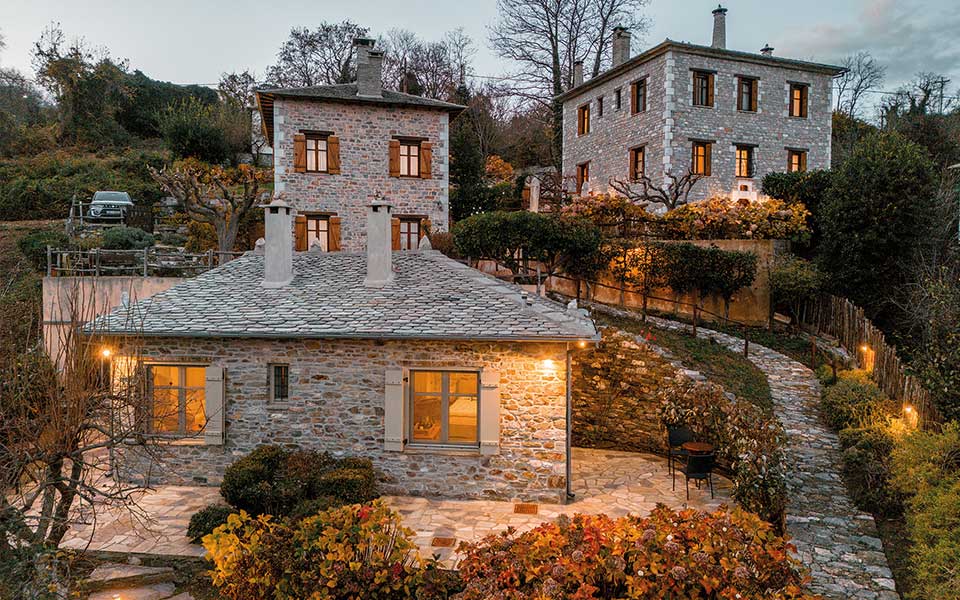Montanema Handmade Village
In September 1999, Christos Athanasiadis went on vacation to Lake Plastiras. Jaded with his job and his daily routine in Athens, he was recharged by his break. He convinced the owner of the house he stayed in to sell it and a parcel of land to him. “This little house, ‘To Konaki’ as we call it, served as a refuge. It could be reached only on foot or via a dirt road. There was no electricity, but there was a stream, so there was plenty of water. Without electricity, everything was difficult but it was also very interesting for an Athenian like myself. I chopped wood for the woodstoves and fireplaces, and it was fun. All my friends who would visit me from time to time were impressed, because they also got to experience something that was new to them. Despite a lack of certain things, you didn’t feel like you were missing out on anything. On the contrary, it was as if you had travelled back in time. You could imagine how people lived with just the essentials, and that made you feel self-sufficient.
“My friend Dimitris Panagopoulos was one of my visitors,” Christos continues, “and when I told him my idea, he was excited because he saw the love I had for the place. We started this venture together, with the idea of designing something that would mirror what we’d experienced here, only bigger. And that’s how Montanema Handmade Village was born.”
Just a few kilometers from Lake Plastiras, on the western slopes of the Agrafa mountain range, on a peak overlooking the Athochori Gorge and in a rugged mountainous region where the first snow makes its appearance in December and only begins to melt away in March, the construction of a guesthouse is no easy task. But Montanema is not just a guesthouse. It is a mountain destination for hospitality comprised of 34 houses that extend around a main building with a restaurant, coffee shop, spa, kitchen and workshops. There’s a farm, an orchard, a wine cellar and vineyards as well.
Info
Anthochori, Karditsa
Tel. (+30) 24450.452.20
Double rooms start from €135 with breakfast
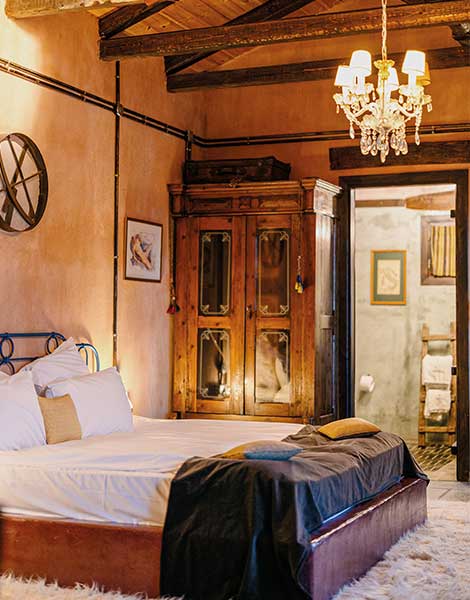
© Angelos Giotopoulos
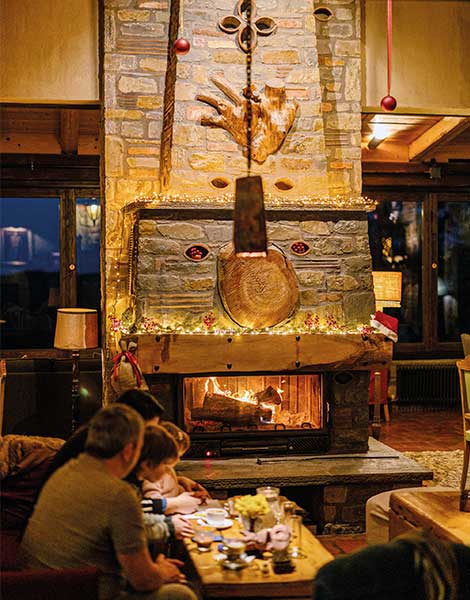
© Angelos Giotopoulos
A community of friends
The guesthouse opened in 2014, but it didn’t take its final form until 2022. Every house is unique, and the Village has been built in such a way that, wherever you stay, you have a view of both the gorge and the pine-filled slopes. Each house has been carefully designed and decorated by Christos himself. Many of the objects are from his personal collection. Lining the wall of the stairs that lead to the spa are keys that he bought at a flea market in Peru, the lounge area is decorated with objects that he brought back from his trips to China and India, the wood carved object in the reception area is an old candle stand from a church in Mitropoli, a village that lies along the road from Lake Plastiras to Karditsa, and other objects have been made by him.
Artemis joined the team two years before Montanema opened its doors. Living here and adjusting to a slower pace of life, she began to get involved with essential oils and the production of soaps, an activity that is now offered to guests. “People come here to relax, to take walks in nature, to see us and our dogs,” says Artemis, while Christos adds: “We want to create a community. People know what to expect when they visit Montanema. Compared to when we first opened, we have become a bit more minimalistic. For example, in the beginning the houses had televisions, but we took them out a couple of years ago.”
Christos and his team grow their own fruits and vegetables and work the farm, producing their butter, cheese and meat. They also make wine and tsipouro, as well as aromatic products for the houses. “Our next goal is to become fully autonomous and self-sufficient,” says Christos.
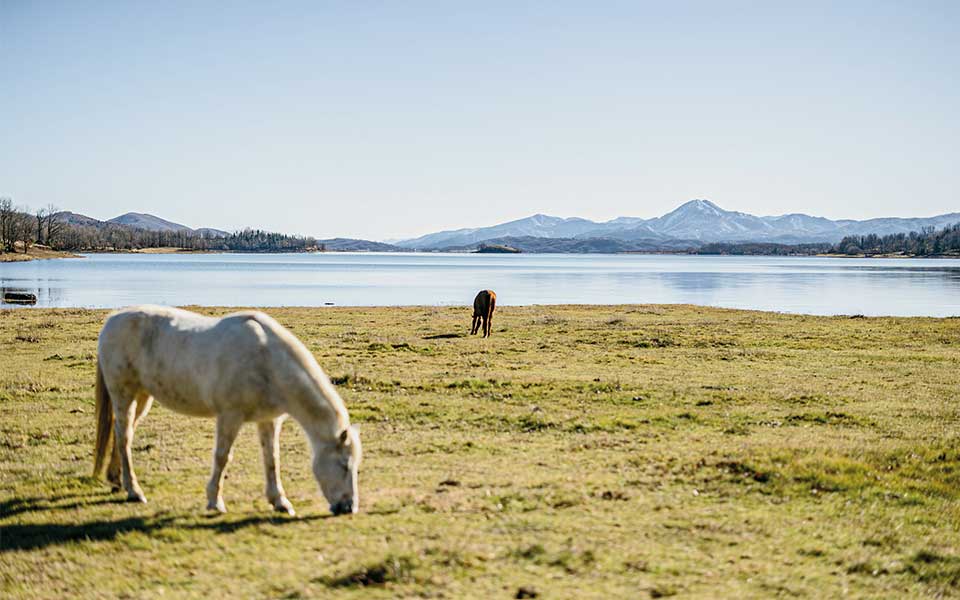
© Angelos Giotopoulos
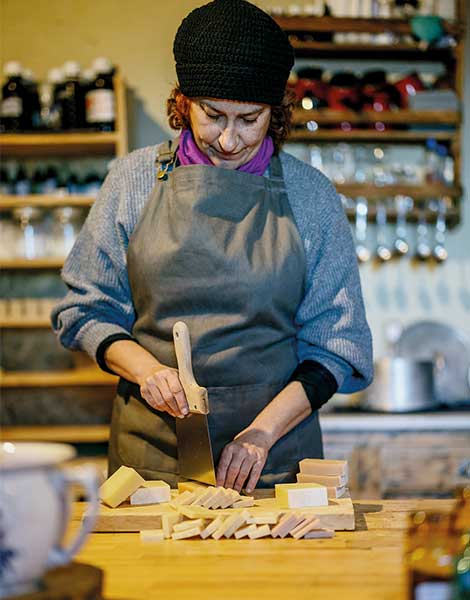
© Angelos Giotopoulos
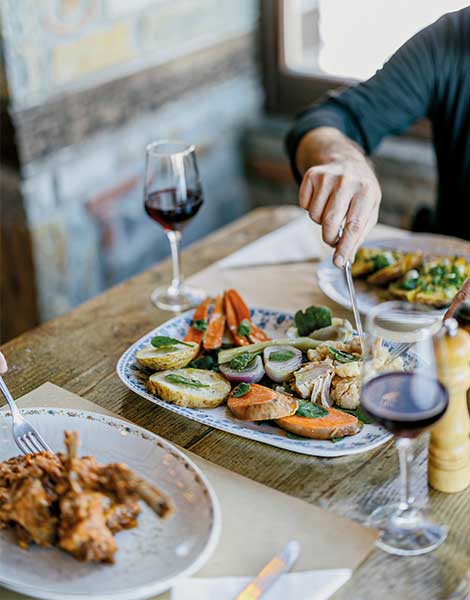
© Angelos Giotopoulos
A host of activities
Around Montanema, trails zigzag their way through fir trees and wildflowers to mountain peaks and to the waterfalls of Anthochori, as well as other points of unparalleled beauty. You can stop in at the farm; you can play on the big swing, with its views of the forest. The guesthouse’s staff can give you directions or accompany you, as you like. The guesthouse also organizes woodland picnics. What’s more, mushroom and fruit foraging excursions are on offer. Children will love the pony rides, and there’s even an archery area. At the guesthouse, visitors can take cooking lessons; in spring, they can learn how to make cheese. At the soap workshop, guests can try their hand at making their own soap. The spa has a pool, Jacuzzi and hammam, and various treatments and massages are offered. A restaurant and coffee shop are open all day in the main building.
Kalderimi Country House
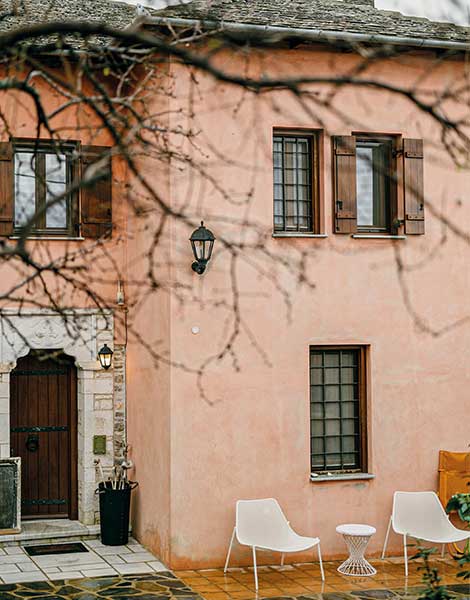
© Angelos Giotopoulos
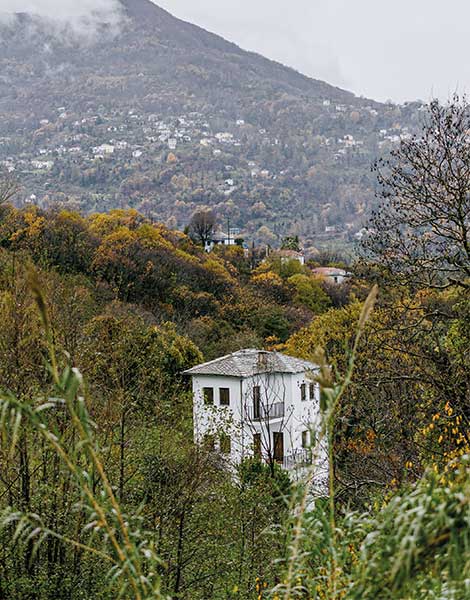
© Angelos Giotopoulos
From 1983 onwards, Elisavet Proestaki and Xenophon Karydis spent vacations in Pilio – they spent their honeymoon there, too. It wasn’t until four years after that trip, however, that they realized that Pilio is, in fact, the place for them. In 2005, they bought an old building, which they intended to use as a summer house. At the time, they lived and worked in Athens. Xenophon was a biologist and Elisavet was a teacher. Although the village of Mouresi hasn’t made its way into the travel guides yet, that hasn’t stopped people, including more than a few artists, from buying a house there. Their house used to belong to a wealthy family; it wasn’t easy to bring it back to its old glory.
Eventually, Xenophon and Elisavet decided to turn it into a guesthouse. “It was very difficult,” says Xenophon, “not only because it’s located in an area that is difficult to reach, but also because renovation works are a lot more complicated than constructing a new building. We wanted to retain as many elements from the original building as we could, but it wasn’t always possible. For example, on the side that faces the sea, the house was dark because it had very narrow windows, like the openings you see in fortifications. So, we made them bigger.”
Info
Mouresi, Magnesia
Tel. (+30) 24260.494.53
Double rooms start from €95 with breakfast
Open April-October, and during the holiday season
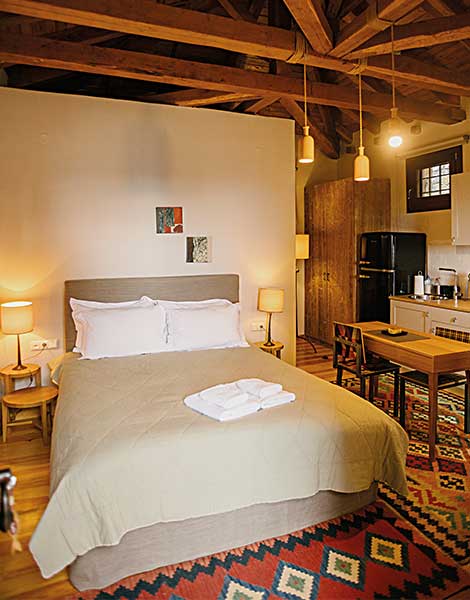
© Angelos Giotopoulos
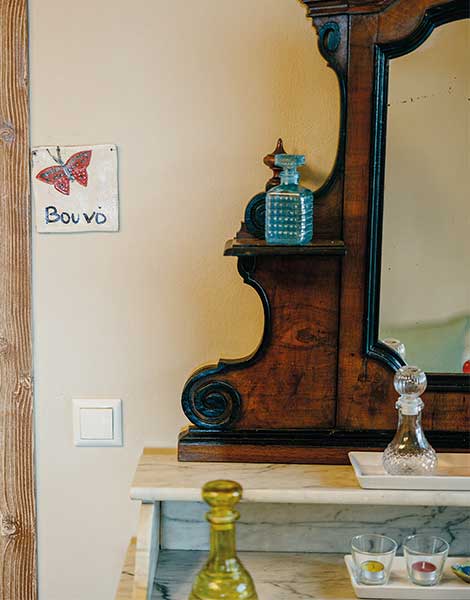
© Angelos Giotopoulos
The renovation efforts
With the help of a specialized company, they stripped out the old material and then began on the design and construction work. They took great care, in terms of both the interior design and the furnishings. The linen is made from organic cotton, the two marble corbels on either side of the fireplace in the common room are made from Pentelic marble and were salvaged from a house in the center of Athens that was demolished; the lighting fixtures are handmade; the leather couches were imported from abroad; and so was the table on which breakfast is served today – an old wooden table from England.
Every object has a story behind it and Xenophon and Elisavet are always eager to tell them. In the bedrooms and in the room where breakfast is served, the walls are adorned with paintings. Breakfast includes homemade dishes that are prepared with as many local ingredients as possible. A woman known affectionately as “Mrs. Demi” comes from the neighboring village of Kissos to make bread from Thessalian flour; fruit comes from the orchards; and, in the summer, the garden supplies the guesthouse with vegetables for the omelets and soups. In the open kitchen, guests can see how dishes are made, and every morning they wake to the smell of freshly baked bread.
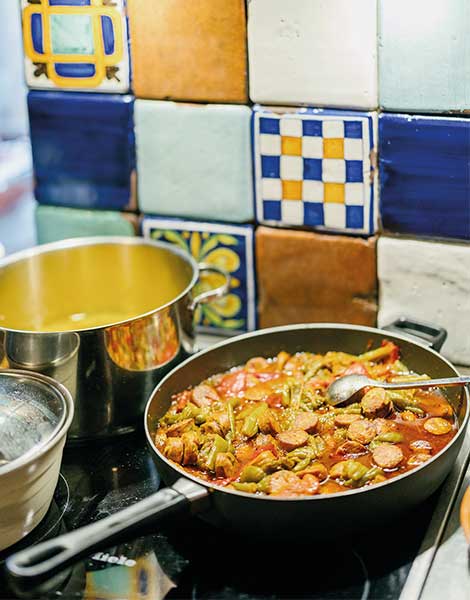
© Angelos Giotopoulos
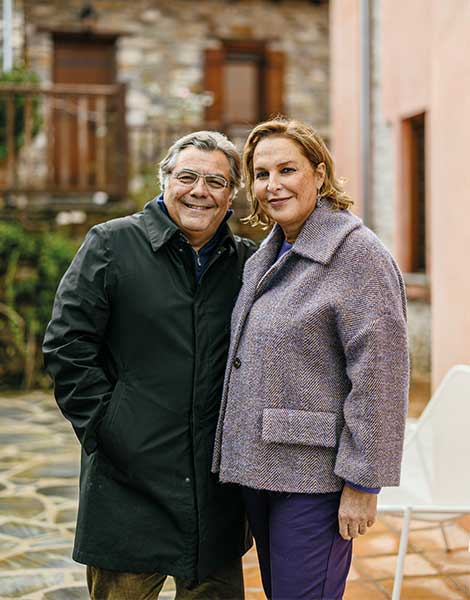
© Angelos Giotopoulos
The views, the trails, and the sea
A traditional cobbled path – which is where the guesthouse gets its name from (in Greek, “Kalderimi” means “cobblestone path”) – runs next to the guesthouse and leads, after about a 35-minute walk, down to the sea. “The word kalderimi carries a certain connotation. In the past, people would communicate via cobblestone roads. This is what we want to bring back,” says Elisavet. Foreigners who come here to enjoy the activities and the hiking trails really appreciate the paths, couples love the views, families like the easy access to places where children can play, hikers love the abundant nature that surrounds the village, and beachgoers love the proximity to the sea.
It’s this variety of options that Xenophon and Elisavet loved about eastern Pilio, and why they made their home, which they now open up to everyone, on these mountain slopes. In the breakfast room, Elisavet is looking at the paintings. One depicts a boat and the words that George Seferis, the Greek poet, penned about Pilio. She recites them by heart “ʽIn Pilio among the chestnut trees / the centaur’s shirt / rising from the waters of the sea / I encountered the waters of the mountain.’ I say these lines, and I’m overcome with emotion, because this is what Pilio truly is,” Elisavet says.
Guesthouse Souliotis
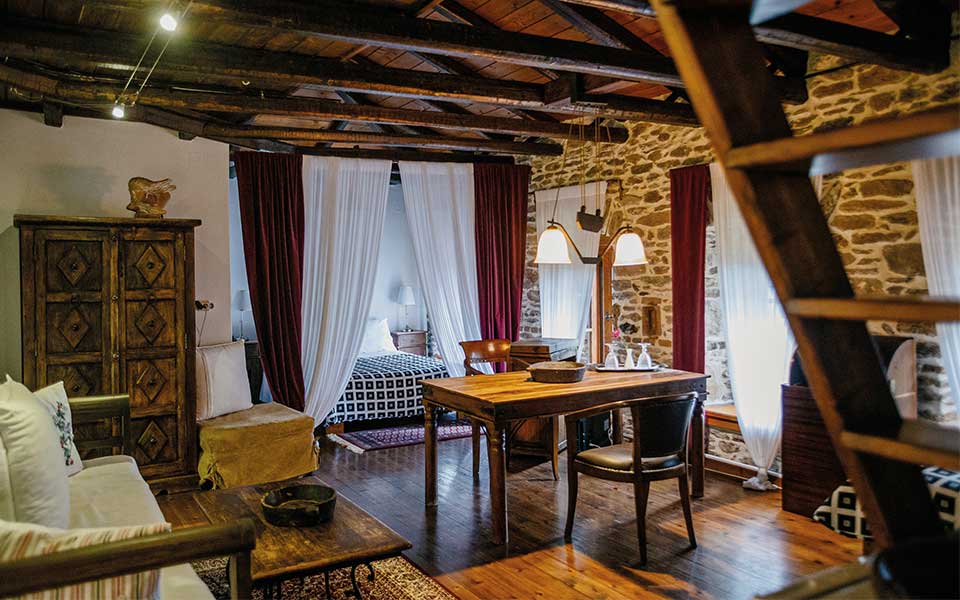
© Angelos Giotopoulos
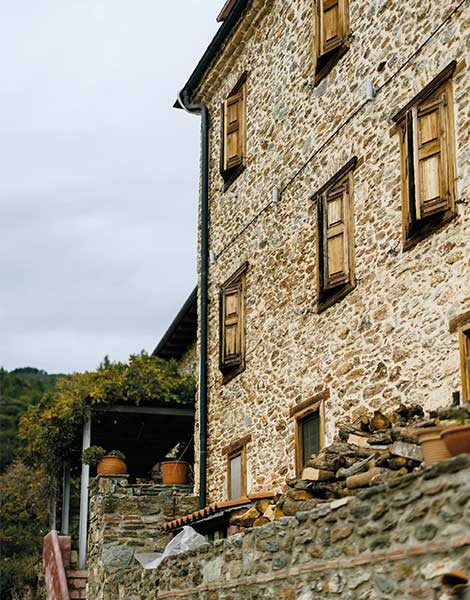
© Angelos Giotopoulos
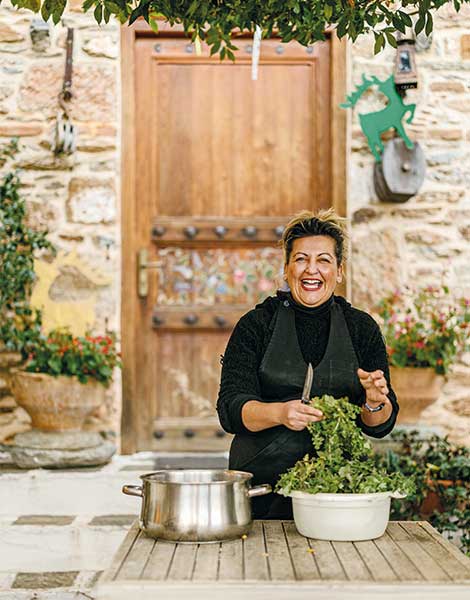
© Angelos Giotopoulos
The building that today houses the Guesthouse Souliotis was built by a prosperous family from Smyrna around 1850 but Roulis Souliotis didn’t come across it until 1995; from that moment on, he was determined to make it his. Until 1999, when he succeeded inpurchasing it, Roulis would walk by the house and marvel at it. He liked how big it was, and how its courtyard held it in “a warm embrace,” as he described it. The ambitious renovation project that followed the purchase lasted a year and a half; the builders used the same local stone as the original. The guesthouse, which opened its doors at Easter of 2001, is built on a great rock. In fact, the rock is an architectural element of one of its rooms. “I tried,” Roulis says, “to give visitors a sense of the region, to understand where they are. At the same time, I also let my neighbors know that an old building can be reused; it can combine the comforts of a modern house with the aura of the time when it was built.”
Most of the village’s houses have three stories and are made of stone. They are relatively spacious and were built by craftsmen from Epirus who brought their knowledge of construction to the area. This style of architecture, together with the peacefulness and the beauty of the landscape, came to be appreciated by musicians, architects and journalists who, over the years, settled here, too, restoring old houses and saving them from destruction in such great numbers that Metaxochori came to be known as “the village of artists.” “Visitors come here because they know it’s a village that hasn’t undergone a lot of changes, without a lot of tourism, a village that’s alive, with a traditional coffee shop, a traditional village square and local people. They want to visit a place that hasn’t lost its character,” says Roulis.
Info
Metaxochori, Larissa,
Tel. (+30) 24940.220.40
Double rooms start from €85 with breakfast
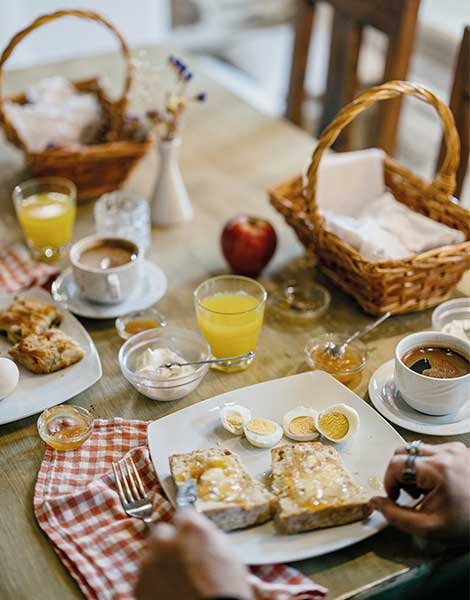
© Angelos Giotopoulos
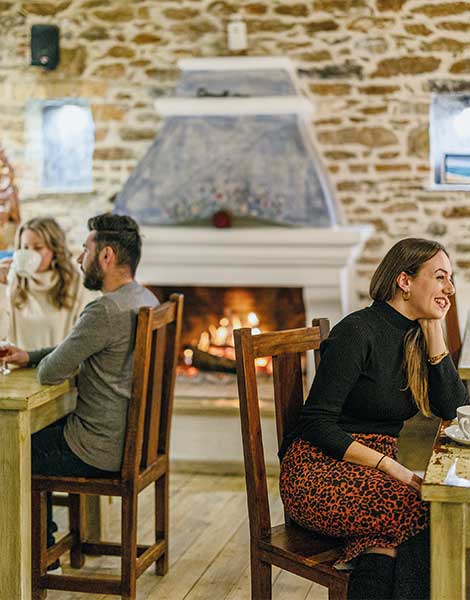
© Angelos Giotopoulos
Amidst nature
Located among the foothills of Mt Kissavos on the road towards the Thessalian beaches, close to the city of Larissa on the Thessalian plain, Metaxochori is easily accessible. Despite that convenient location, however, it has the feel of a remote mountain village. The nearby ravine, the many plane trees in the village square, the 02 National Trail that runs past the guesthouse and links Mt Olympus to Mt Pilio, the oak forest on the lower plains, and the dense beech forest high on Mt Kissavos attract hikers and other nature lovers.
In cooperation with a local outdoor activity company, Roulis offers excursions to Mt Kissavos, as well as through the gorges and along the rivers of Thessaly. He also conducts tours of Metaxochori itself, showing visitors the historic houses and churches and guiding them around the cobblestone streets. He also organizes visits to the Yiam Flavor Lab, a culinary workshop run by Avra Panousoupoulou; the lab is nestled between apple and quince orchards just a little outside the village of Agia. At the workshop, visitors can witness firsthand how marmalades, preserves and other foods are made, and even help in their production.
The guesthouse has seven bedrooms and a large common room with a fireplace where breakfast, coffee and beverages are served all day. The walls are adorned with works of local painters, and the music is always carefully selected. The cool, flower-filled courtyard with views of the plain and the mountains is an ideal refuge in the summer. Breakfast includes homemade pies, marmalades, local honey and fruits. Roulis’ plans to increase his capacity further by renovating the stone house across from the current guesthouse.
Kritsa Gastronomy Hotel
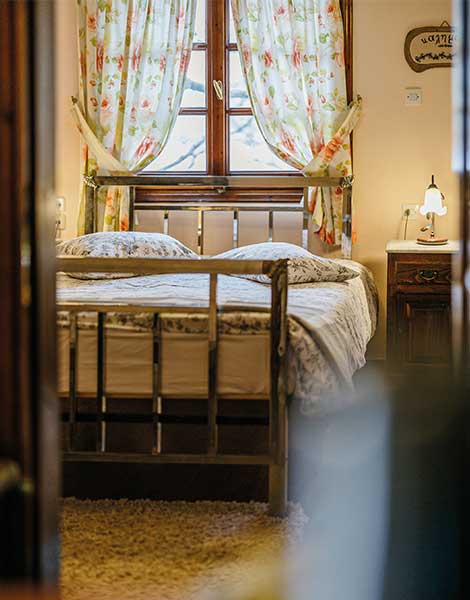
© Angelos Giotopoulos
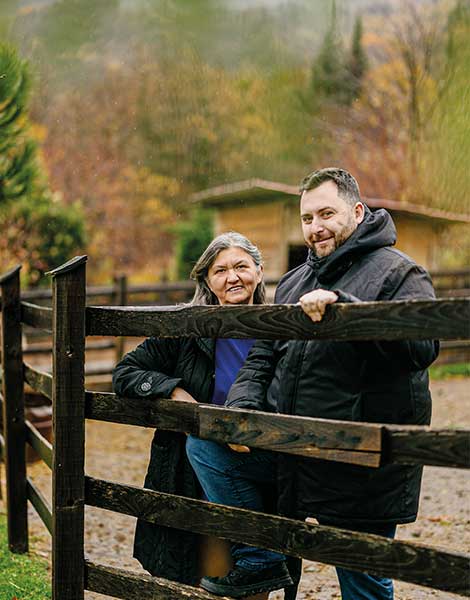
© Angelos Giotopoulos
The village square of Portaria is a popular meeting place. The restaurant Kritsa and the guesthouse that operates above it are open all year round, from afternoon until late at night. “The building itself has historical significance. It operated as a dairy shop from 1912 and as a hotel from 1932 – at the time it was one of the region’s first hotels,” say Eleni Kraiskakou, who, from 2000, has been running the guesthouse and the restaurant together with her family.
In 1920, the village of Portaria was listed in a royal decree (along with the Athenian suburb of Kifisia and the island of Hydra) as a place for recreation and a place of outstanding natural beauty. In 1978, Portaria was among the first settlements in Greece to be characterized as a traditional settlement and be given special protection status. Its proximity to Volos, the region’s rich flora and the views it affords of the Pagasetic Gulf make Portaria one of the top tourist villages of Greece.
Two sisters, Niki Liamou-Andrinou and Eleni Karaiskou, grew up in Portaria and always dreamt of opening their own restaurant. Both are excellent cooks, so they searched for a place in the village where they could showcase their culinary skills. They named their restaurant “Kritsa” in honor of the building’s owner.
Info
Portaria, Magnesia
Tel. (+30) 24280.991.21 and (+30) 24280.900.06
Double rooms start from €62 with breakfast
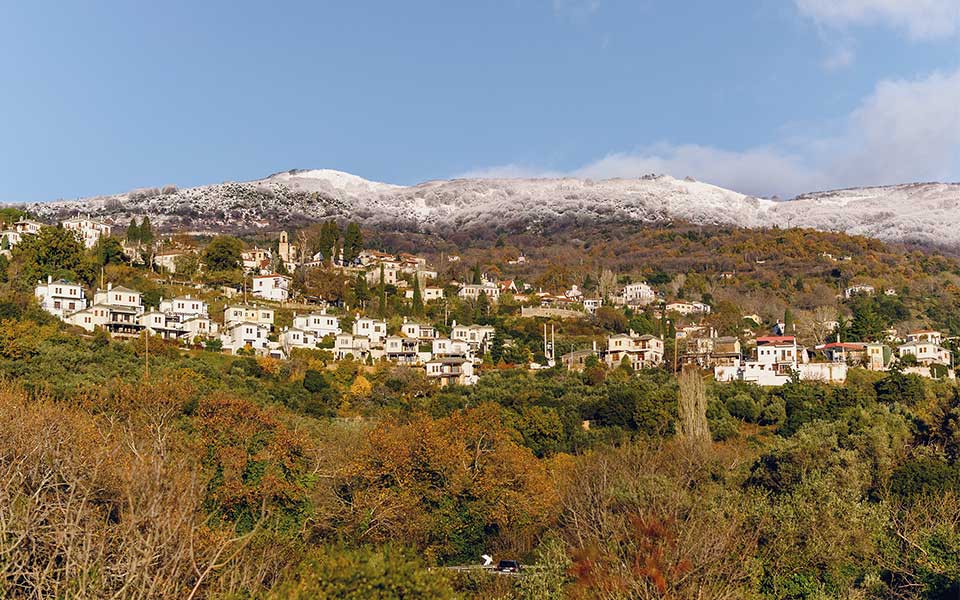
© Angelos Giotopoulos
The restaurant opened its doors on December 23, 2000. “We began with the dishes we knew, the ones that we made for our own families. We didn’t look at what other restaurants were doing. We got a pen and paper and started writing down the dishes we cooked in our own homes. For the first time, menus had sautéed greens with eggs, sunny side up; spentzofai [country sausages with red peppers and tomatoes]; trachana [fermented cracked wheat]; savoury pies; boubari [a local sausage made with offal]; chicken soup – dishes we were already making. Our house was always open to everyone, which meant that we always had a lot of people over. And this is how I feel in the restaurant. People come and I host them,” Eleni says.
In 2001, they fixed up the two floors above the restaurant and started operating a guesthouse. Everyone lends a hand at the restaurant, including the younger members of the family, who come back from university over the summer to help out. Later, they opened the café Agora 1955 on the village’s main square; it serves coffee, breakfast, light meals and local products. Their love for the rural way of life spurred them on to buy 1.2 hectares of land two kilometers outside of Portaria at an elevation of 700 meters; today it’s a working farm with animals, crop fields and a few buildings.
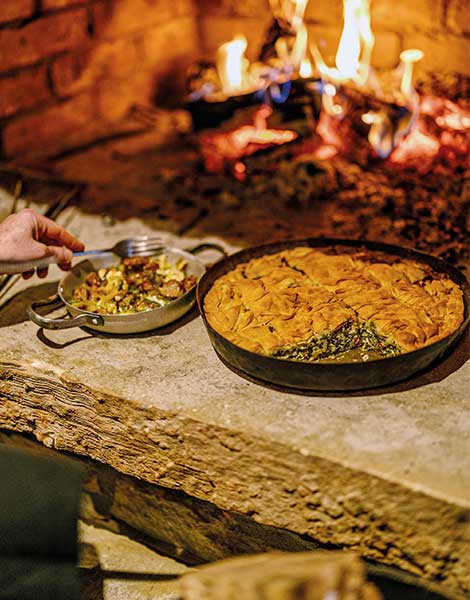
© Angelos Giotopoulos
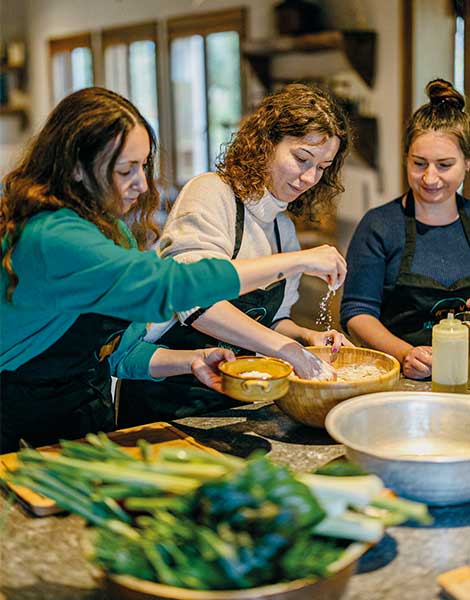
© Angelos Giotopoulos
Cooking in the countryside
At the center of that farm, next to a room with a large monastic-style table, George and Annita are waiting for us in the kitchen. They have both worked with the family for years, working in the restaurant and organizing the cooking lessons that are given on the farm. Fried meat with leeks, savory treats made with filo pastry, and many other traditional local and national dishes are prepared here under the guidance and supervision of the two cooks. Stefanos, who wasn’t there that day, attended cheesemaking courses at the American Farm School in Thessaloniki and usually shows visitors how to make trachana and different cheeses; George makes pickled vegetables and tsitsiravla (a local spicy meze with greens); and Annita makes marmalades and preserves. The grounds are full of fruit trees, including plum, fig, apricot, cherry, sour cherry and quince trees, and in the winter garden, they grow cabbage, lettuce, spring onions, leek and various aromatic herbs. Anyone who wants to take cooking lessons has to gather the vegetables they want to use from the garden and take the eggs they need from the chicken coop before they’re allowed to enter the kitchen.
The farm also has accommodations for those who prefer a quieter, more peaceful environment than what they’d find in the center of Portaria. “A few years ago, we added gastronomy to the hotel’s name. We are now called Kritsa Gatsronomy Hotel. To us, food plays an important role. I don’t want to exaggerate, but this is what we do. This is our core activity; making good, traditional food. A lot of our visitors tell us ‘We have come to eat and stay’. And we have a lot of return customers” says Eleni. The guesthouse was one of the first to join the “Greek Breakfast,” a culinary program of the Hellenic Chamber of Hotels stressing the use of Greek products in the hospitality industry. The restaurant was one of the first to receive the special Greek Cuisine distinction from the Greek National Tourist Organization. Since 2019, their farm has hosted the Pelion Gastronomy Festival, welcoming the participation of many small local producers. Last year, the floods in Thessaly forced the organizers to cancel the festival; this year the festival will be held in June.
Amanita
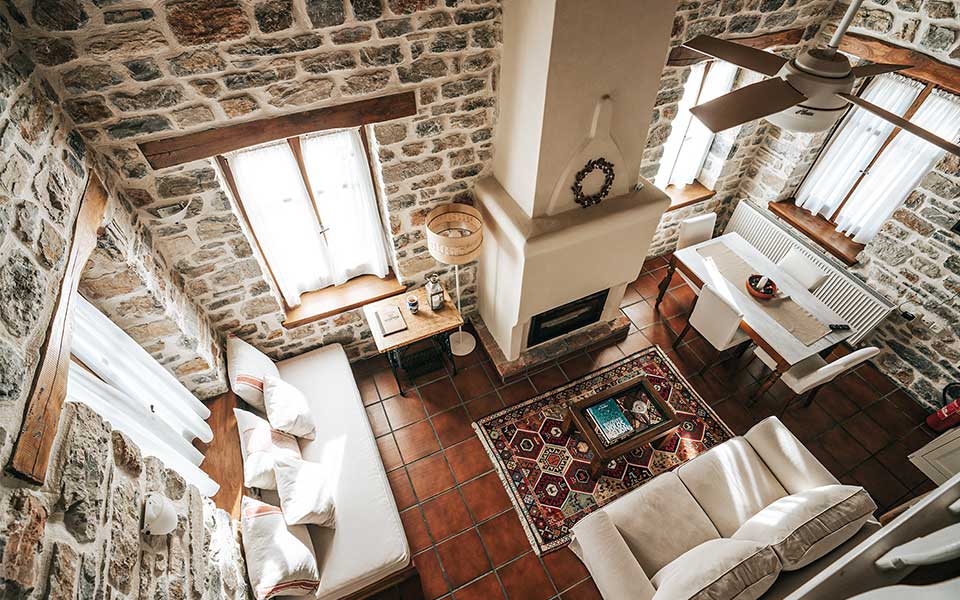
© Nikos Karanikolas
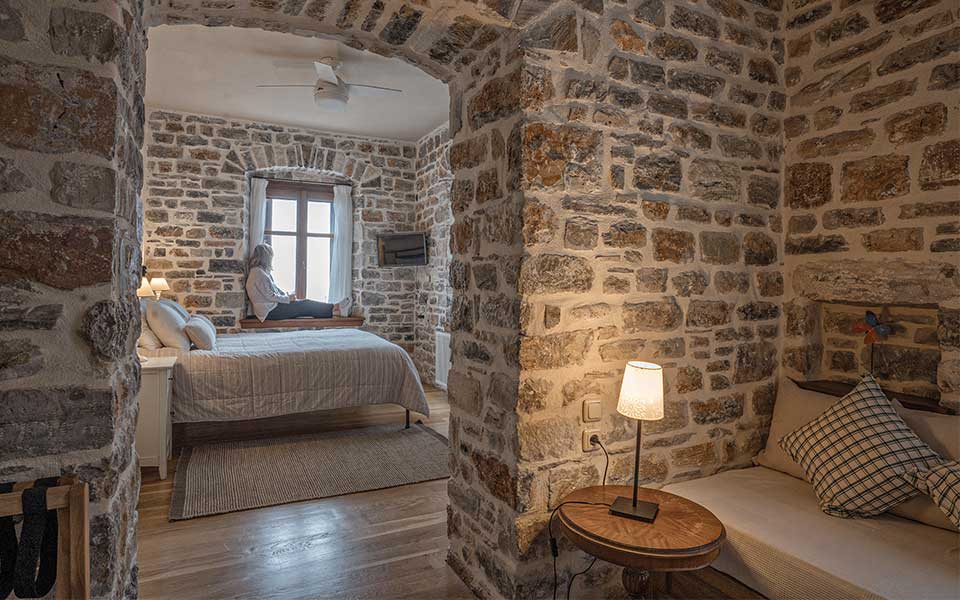
© Nikos Karanikolas
Living in Athens, but with fond childhood memories of growing up in the country, Filaretos from Karditsa and Marianna from the island of Sifnos travelled a lot around Greece. In 1992, they bought a plot of land in the village of Tsagarada; it had an old derelict house on it, and their plans were to build a summer house there one day. The years went by, and they both put in long hours in the city, Filaretos in marketing and Marianna as a lawyer. In 2002, they decided to convert the old house into a small guesthouse. So, they began renovating the property and its outbuilding, and opened the guesthouse in October 2006, with six rooms to rent. “We knew nothing about the region or about the hotel business. We took on the endeavor from the perspective of a guest: what would we want, how would we like to be taken care of? Between 1992 and 2002, we had stayed in a lot of guesthouses around Pilio. So, we knew what the region didn’t have.”
Info
Tsagarada, Magnesia
Tel. (+30) 24260.497.07
Double rooms start from €95 with breakfast
Open April-October, and during the holiday season
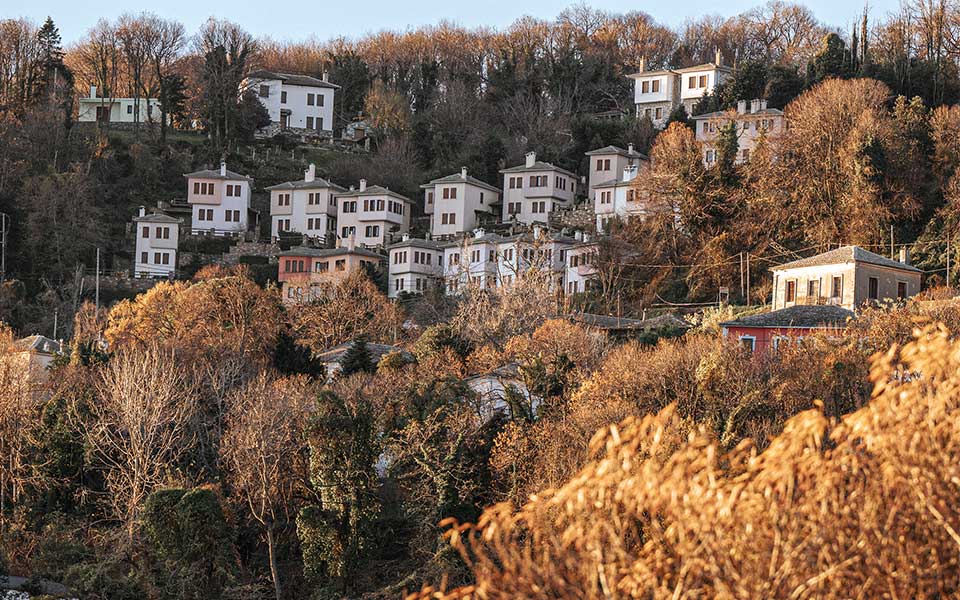
© Nikos Karanikolas
A unique breakfast idea
Amanita quickly made a name for itself by offering outdoor experiences and activities at a time when the hotel landscape was dominated by pools and Jacuzzis. The very first weekend after they opened, they organized a mushroom hunt, relying on what Filaretos had learned from a carpenter who had worked on the guesthouse renovation. Other activities included walking tours and participation in the production of traditional sweets and the distillation of tsipouro. At the forefront of what they offered was their amazing breakfast, which played an important role in the visitors’ experience. “I began making marmalades; I searched for local cheeses and meats; I brought hand-kneaded bread back from the nearby villages of Lehonia and Palaia until I began making it myself. A woman in Zagora gave me yeast and I started baking bread at the guesthouse. I remember that, in the beginning, the breakfast we offered was very basic, but it had a certain element of care and authenticity to it. That authenticity was us. And as our guesthouse took off, the concept of small producers began to develop, too. We were among the first to be invited to the “Greek Breakfast” program, a culinary initiative of the Hellenic Chamber of Hotels.”
Filaretos and Marianna slowly began to work on the land around the guesthouse. Their holding was a third of a hectare. With the help of a neighbor, they planted about 50 trees – local varieties of apple, pear, plum, sour cherry and cherry. They also planted a kitchen garden and an herb garden, and sought out indigenous seeds in the neighboring villages of Pilio. In Peleti, they attended seminars on medicinal herbs.
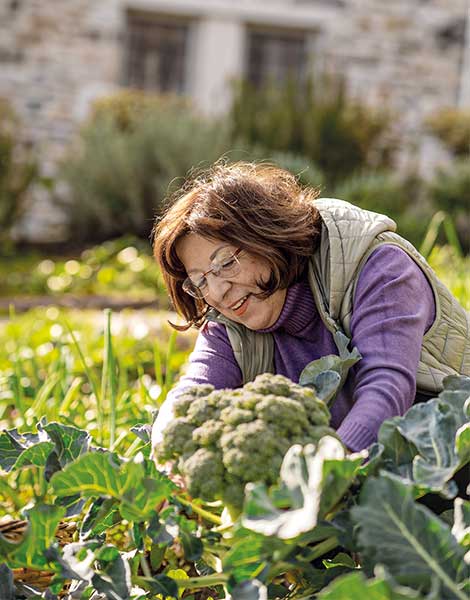
© Nikos Karanikolas
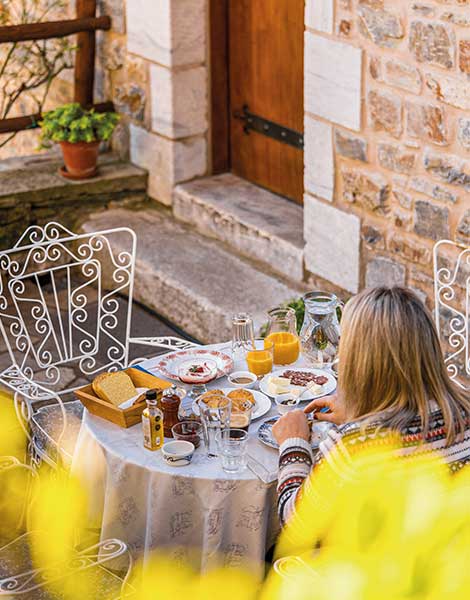
© Nikos Karanikolas
During the economic crisis that hit Greece, the guesthouse turned to foreign tourists, to people who at the time were more familiar with experience tourism than their Greek counterparts. In this way, the guesthouse was able to expand its client base. In addition, it added two studio apartments in the herb garden and another apartment to the existing six rooms in the main building. New activities also continued to be added because, as Filaretos says, sustainable tourism needs change or it stagnates.
Over the past few years the experiences offered at Amanita have become more oriented towards gastronomy; guests can pick fruits from the trees and vegetables and herbs from the gardens, take cooking lessons from chef Kostas Patistis or enjoy wine and olive oil tastings organized in collaboration with the Patistis brothers, who are also wine and olive oil producers. The activities are adapted to the visitors and what they would like to do. The experience, however, that is offered is a real farm-to-table experience enriched with the passion and knowledge of the guesthouse’s owners. “A group of friends who cook and then eat together,” says Filaretos, in a place that has been warmly welcoming guests for the past 17 years.

